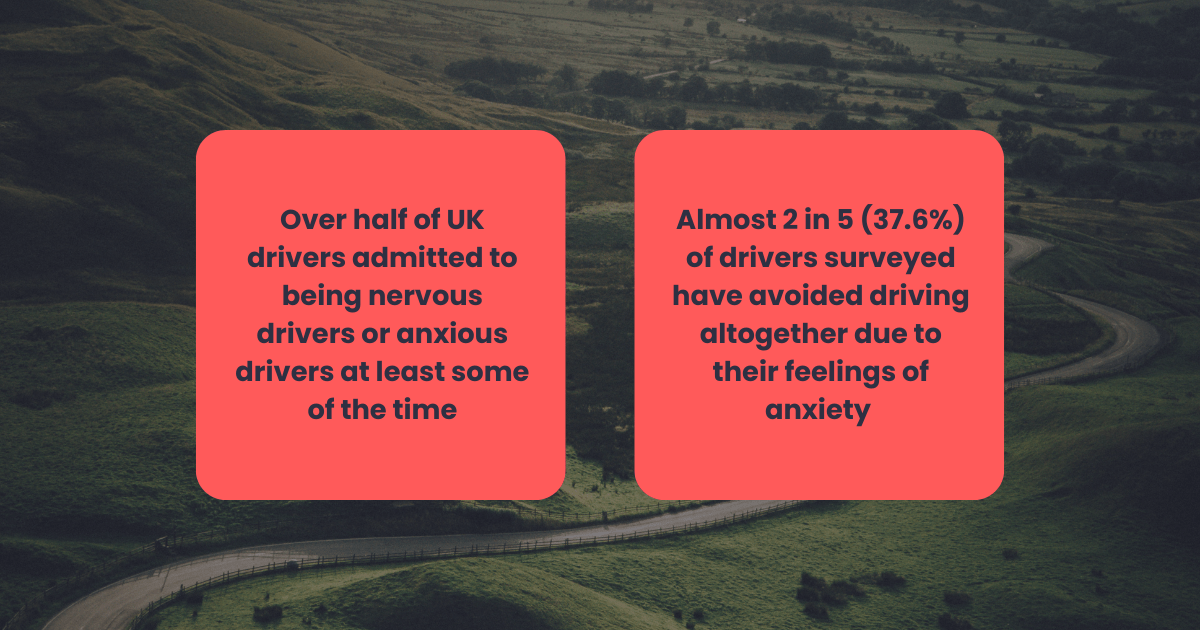
Do I Have to Pass My Theory Test Before Learning to Drive?
Find out whether you need to pass your theory test before you start learning to drive and what other requirements are needed.
Learning to drive can be an exciting milestone, but for many learner drivers, it also brings fears and anxieties. Whether it’s the fear of being on the road, concerns about making mistakes, or the overwhelming responsibility of controlling a vehicle, driving anxiety is a common issue. In fact, it’s more common than many might think, especially for those who are new to driving. Overcoming these fears is crucial to becoming a more confident and safer driver. In this blog, we’ll explore what driving anxiety is, common causes, and actionable tips on how to overcome it, giving you the confidence to enjoy your time behind the wheel.
Driving anxiety refers to the nervousness, fear, or panic some people experience when they think about or are actively driving. It’s a form of situational anxiety that may affect learner drivers, new drivers, or even experienced drivers in specific situations like busy roads or unfamiliar routes. This anxiety can range from mild discomfort to intense fear, often referred to as driving phobia or ‘amaxophobia’.
For those affected, it can impact their ability to focus, make safe decisions, or even progress in their driving lessons. In more severe cases, it can lead to avoidance, where learners continually put off driving lessons or practice. Fortunately, driving anxiety is something that can be managed and, in most cases, overcome with the right strategies.

Driving anxiety is usually caused by a combination of fears and stressors. Recognising these reasons is the first step in addressing them.
One of the biggest causes of driving anxiety is the fear of being involved in an accident. The thought of causing harm to oneself or others can create overwhelming anxiety.
Learner drivers may feel out of their depth when they start driving. Handling a vehicle while navigating roads, traffic, and obeying road signs can feel like a lot to manage, particularly in the early stages.
The fear of holding up traffic or being judged by more experienced drivers can cause anxiety. This pressure is often felt in busy environments like roundabouts or motorways where there’s little time to think.
The thought of failing the practical driving test is a common source of stress. Learners may fear being judged or worry about the consequences of making mistakes during their test or lessons.
Whether it’s driving at night, in heavy rain, or on unfamiliar roads, new drivers may feel uneasy in these conditions. This unpredictability can heighten anxiety as they are still developing their driving skills.
Sweaty palms before even starting the car, just thinking about driving.
Avoiding driving lessons for fear of embarrassing mistakes.
Feeling overwhelmed on busy roads or roundabouts.
Heart racing when asked to reverse or park in a busy area.
Dreading motorway driving, even though it’s part of becoming a confident driver.
In July 2023, JTAPE carried out a survey looking at the biggest fears of UK drivers. 622 respondents took part in the survey to examine what the main fears of UK drivers were. This includes weather conditions, road conditions, driving capabilities and other factors.
JTAPE are an automotive adhesives business who manufacture car-masking products from high quality materials. They manufacture products which are used by leading names in the automotive industry, including BWM Mini, Jaguar, Landrover, Rolls Royce, Nissan and Toyota.
Source: https://www.jtape.com/news/survey-uk-drivers-biggest-fears/
Managing and eventually overcoming driving anxiety takes time and patience. By incorporating the following tips, learner drivers can gain the confidence they need to tackle the road.
Start slow by driving in low-pressure environments such as quiet residential areas. Gradually increase the difficulty of the routes, taking on busier roads as your driving confidence builds. The more exposure you have, the more familiar driving will feel.
It’s common for learner drivers to feel anxious if they’re not progressing as quickly as expected. Booking extra lessons or a refresher course with a supportive driving instructor can help reduce fear by building confidence.
Anxiety often causes shallow breathing and an increased heart rate. Before driving, practice deep breathing exercises to calm your nerves. Techniques such as counting your breaths or mindful relaxation can help reduce the physical symptoms of anxiety.
Don’t expect to master driving in one day. Set small, achievable goals for each lesson or driving session, whether it’s parking confidently, handling a roundabout, or simply driving for 20 minutes without feeling anxious.
Give yourself time to become comfortable with driving. Don’t let external pressures from other drivers, instructors, or even friends and family force you into situations before you feel ready.
After each driving session, take time to reflect on what went well. Focusing on your progress, even small wins, can help boost your confidence and reduce anxiety over time.
Having a calm, experienced driver as a passenger can help reduce nerves. They can offer reassurance and support while keeping you focused and relaxed during practice sessions.
The more regularly you drive, the quicker your confidence will build. Try to practice as often as possible, even if it’s for short periods, as consistency will make driving feel more natural.
If a specific situation, such as motorway driving or parallel parking, causes anxiety, focus on gradually practising that skill. Over time, the fear will diminish as you become more comfortable with the task.
A calming environment can significantly reduce driving anxiety. Personalise your car to make it feel more comfortable, whether that’s playing calming music, using diffusers with soothing scents like lavender, or adjusting the seat and mirrors to optimise comfort. Ensuring the space feels familiar and relaxing can help reduce tension.

Driving anxiety is a common experience, particularly for learner drivers. However, by understanding its causes and taking practical steps to overcome it, anxious drivers can gradually build their confidence and become comfortable behind the wheel. Whether it’s practising mindfulness, setting small goals, or seeking support, there are numerous ways to manage and reduce anxiety. With the right approach, driving doesn’t have to be a source of fear but can become a gateway to freedom and independence.
Commonly asked questions about driving anxiety
Yes, driving anxiety is very common, especially for new drivers. It’s natural to feel nervous when learning a new skill as complex as driving, but with practice, most learners find that their anxiety decreases over time.
Preparing thoroughly and practising relaxation techniques can help. Take deep breaths, stay focused, and remind yourself that it’s okay to make minor mistakes. Instructors look for overall safe driving rather than perfection.
Driving at night can feel more intimidating due to limited visibility, but it can also be a useful way to gradually expose yourself to different driving conditions. Start with well-lit, familiar roads to ease yourself into it.
Many new drivers find motorway driving daunting. Start with short stretches during quieter times of the day to get used to the higher speeds and different driving dynamics. Motorway driving lessons can also be helpful.
If your anxiety becomes overwhelming, it can be helpful to take a short break. However, avoiding driving altogether may reinforce the fear. Instead, try to drive in low-stress environments and gradually work your way back to more challenging situations
You will be logged out in seconds. Do you want to stay signed in?